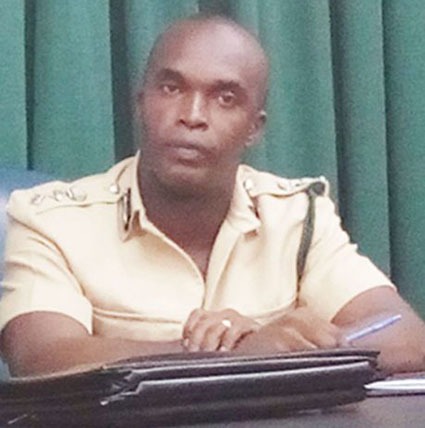In the absence of clear behaviour suggesting that a person may self-harm or commit suicide, there is no way for officers of the prison service to know whether a person who has been arrested is likely to engage in either action, according to Director of Prisons Gladwin Samuels.
Nonetheless, Samuels maintains that the Guyana Prison Service (GPS) is doing all it can prevent suicides by detainees in lock-ups.
His pronouncements came in wake of another detainee recently taking his own life.
Chandatt Yodha, 49, of Lot 18 Bennett Dam, D’ Edward Village, committed suicide in his cell at the Blairmont Police Station lockup by hanging himself with his underwear. The man was allegedly detained for threatening and unruly behaviour against his reputed wife.
On November 5th, Stabroek News also reported that a man accused of raping and impregnating a young relative on November 2nd, was found hanging from his cell bars on November 3rd.
Anecdotal evidence suggests that detainees accused of sexual and domestic violence are more inclined to take their lives when in police custody. In 2018, Stabroek News had reported that a resident of the Mocha Housing Scheme, East Bank Demerara committed suicide by ingesting a carbon tablet while being held at the East Ruimveldt Outpost. The man was being held in custody for allegedly raping a child. It was unclear how he obtained the substance while in detention.
Additionally, on July 2nd, 2018, the Stabroek News reported that a West Coast Berbice man in custody at the Leonora Police Station was found hanging from the window grill of the lock-up. He allegedly used his shirt to commit the act, while four other prisoners were in the said cell. He had been arrested for the alleged rape of a 12-year-old girl.
Police Commissioner Leslie James had told Stabroek News an investigation had been launched into suicide of Yodha, while Samuels had said that while the GPS’ Standard Operating Procedures (SOPs) are aimed at detecting prisoners who pose a suicide risk, they are not activated until a person is processed.
None of those who took their own lives had been taken into the GPS’ custody.
Samuels shared that there are no such SOPs for persons who have merely been arrested, and detained in the lockups, but not yet charged and processed through the court.
These suicides by persons in police detention suggests the need for pre-processing screening or other measures to prevent detainees from taking their lives while in police custody.
Samuels, however, said the GPS is doing all that it can with the resources it has. He further told Stabroek News that there is little that the GPS can do where a person in a lockup or in prison has not been exposed to ranks at either facility for a long enough period of time to suggest that a psychological evaluation should be done, or for trained staff to observe indicators of possible suicide and take precautions. “We have not done anything new. The system can only do so much. A person must be in the system for a while for us to have an idea of whether they should be screened. Some persons are glaringly mad, so that you can recognise a need to give them a psychological evaluation, and or take precautions. Or family members may be able to provide documentation showing that the person is a patient of or receiving treatment from a psychologist,” Samuels explained.
Samuels further suggested that it is impractical to administer a psychological evaluation to every person who is detained, while noting that such an initiative would require placing a specialist in every police station or Division.
Moreover, he said, the GPS does not have its own specialists, and therefore depends the Mental Health Department of the Ministry of Health, the Georgetown Public Hospital Corporation, and Guyana’s psychiatric facility at New Amsterdam to provide the specialists to conduct formal evaluations.
Samuels added that some staff of the GPS have been exposed to training, which now enables them to detect persons who evince tendencies that suggest they are at risk of self-harming or worse. This way, he said, even if a person is at the Guyana Mazaruni Prison, they can be identified if they show signs that they are at risk of committing suicide.
Samuels shared that the GPS even enlists the assistance of fellow detainees, who are at times asked to observe the behaviour of each other, and report any signs that a person is a risk to themselves.
He said that the GPS has even tried to use ‘tamper proof’ cameras in holding areas to observe detainees. He said, however, that detainees often find increasingly innovative ways to tamper with the cameras when they want to engage in prohibited activities. In a previous interview with this news publication, he had also said that detainees have been finding increasingly innovative ways to commit suicide.
When asked whether there is anything further the GPS can and intends to do in light of the fact that suicides persist, Samuels said “we are making the best use of the resources we have.”



